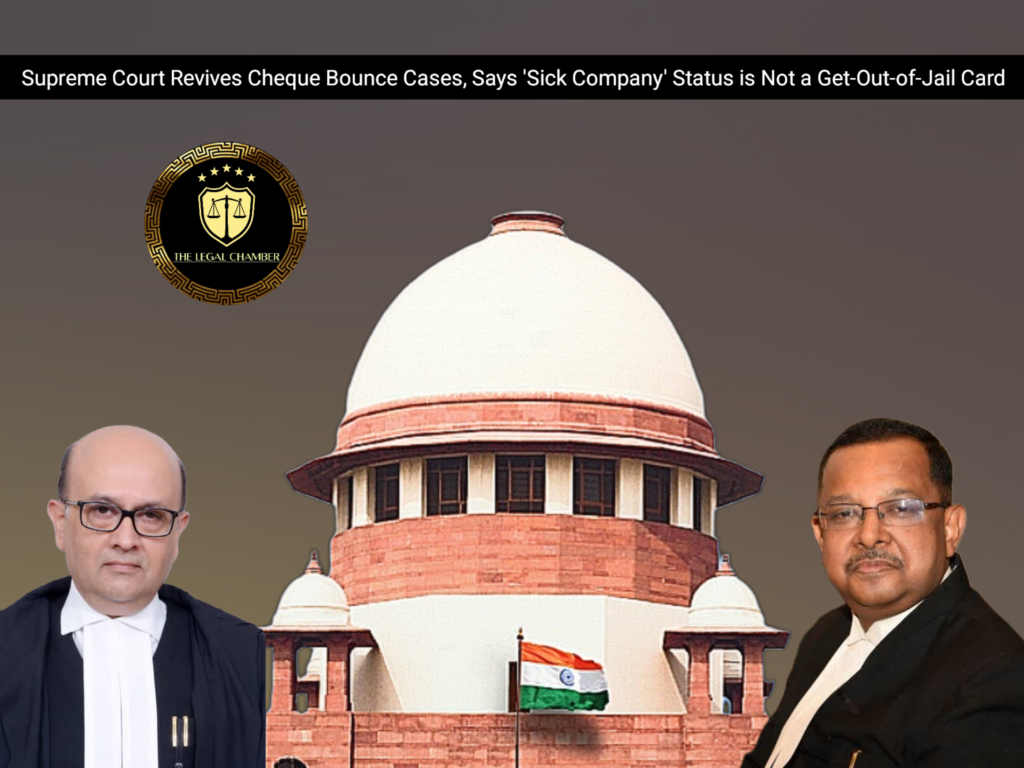
The Supreme Court held that proceedings under Section 138 of the Negotiable Instruments Act are not automatically barred against a company declared sick under SICA, even if a restraint order under Section 22A exists. The nature of the restraint and the purpose of the cheque issuance are mixed questions of law and fact to be decided during trial based on evidence. Furthermore, a Magistrate lacks the inherent power to review or recall the issuance of summons.
Facts Of The Case:
The appellant, Shree Nagani Silk Mills Pvt. Ltd., supplied goods to the first respondent, L.D. Industries Ltd., which was declared a sick company by the BIFR. Towards the payment for these supplies, the accused company issued several cheques in 2001, which were subsequently dishonoured due to “insufficient funds”. The appellant, therefore, filed separate complaints under Section 138 of the Negotiable Instruments Act against the company and its directors. The accused respondents sought recall of the summons and discharge from the proceedings, contending that a restraint order issued by the BIFR under Section 22-A of the SICA prohibited them from disposing of any assets without consent, creating a legal embargo that prevented them from making the payment. Relying on this, the revisional court allowed their plea and discharged the accused. The High Court upheld this decision. The core factual dispute before the Supreme Court was whether the criminal proceedings for cheque dishonour could be stifled at the threshold based on the BIFR’s restraint order, especially when the cheques were allegedly issued for day-to-day operational expenses.
Procedural History:
The procedural history of this case commenced with the filing of complaints under Section 138 of the Negotiable Instruments Act by the appellant before the Magistrate’s court, which summoned the accused. The respondents then filed an application before the Magistrate seeking recall of the summons and discharge, which was dismissed. Aggrieved, the respondents approached the Sessions Court in revision, which allowed their plea, set aside the Magistrate’s order, and discharged the accused. The appellant subsequently challenged this order by filing Criminal Writ Petitions under Article 227 of the Constitution before the Bombay High Court, which were dismissed, upholding the revisional court’s decision. The appellant then filed Special Leave Petitions before the Supreme Court, which, upon granting leave, led to the present criminal appeals that were heard and decided together.
READ ALSO:Supreme Court Ruling: Fraudulent Share Transfer Struck Down: Key Takeaways from the Satori Global Judgement
Court Observation:
The Supreme Court made several key observations in its judgment. It first noted that the statutory presumption under Section 118 of the N.I. Act operates to presume that a cheque was drawn on the date it bears, and the accused must lead evidence to rebut this. The Court crucially observed that the declaration of a company as “sick” under SICA or a restraint order under Section 22-A of SICA does not create an automatic or absolute legal bar to the institution or continuation of criminal proceedings under Section 138 of the N.I. Act. It emphasized that the question of whether such proceedings are affected by a restraint order depends on the nature of the specific order and the facts of the case, particularly whether the cheque was issued for day-to-day operations, which is a mixed question of law and fact to be decided during trial based on evidence. Finally, the Court authoritatively reiterated that a Magistrate has no inherent power to review or recall the issuance of summons, making the revisional court’s order recalling the process legally unsustainable.
Final Decision & Judgement:
The Supreme Court allowed the appeals and set aside the impugned judgments of the High Court and the revisional court. It held that the proceedings on the complaints under Section 138 read with Section 141 of the Negotiable Instruments Act were wrongly quashed. The Court restored the complaints to the file of the learned Magistrate, directing him to proceed with the trials in accordance with the law and bring the proceedings to their logical conclusion.
Case Details:
Case Title: Shree Nagani Silk Mills Pvt. Ltd. vs L.D. Industries Ltd. & Ors. Citation: 2025 INSC 1064 Criminal Appeal No.: Criminal Appeal No. 3821 of 2025 Date of Judgement: September 02, 2025 Judges/Justice Name: Justice Manoj Misra and Justice Ujjal Bhuyan
Download The Judgement Here